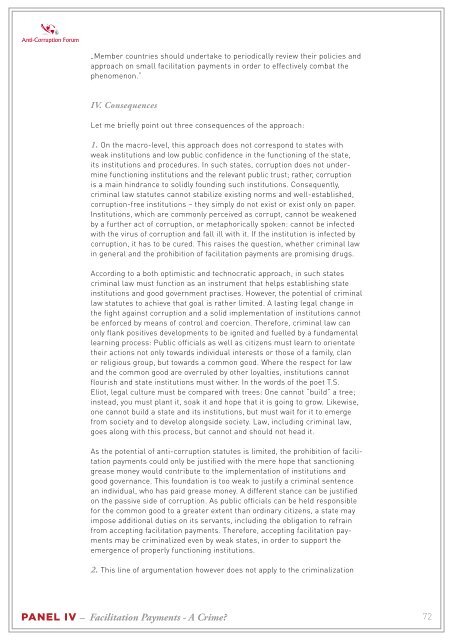Anti-Corruption-conference-ebooklet_einzel_high
Create successful ePaper yourself
Turn your PDF publications into a flip-book with our unique Google optimized e-Paper software.
„Member countries should undertake to periodically review their policies and<br />
approach on small facilitation payments in order to effectively combat the<br />
phenomenon.“<br />
IV. Consequences<br />
Let me briefly point out three consequences of the approach:<br />
1. On the macro-level, this approach does not correspond to states with<br />
weak institutions and low public confidence in the functioning of the state,<br />
its institutions and procedures. In such states, corruption does not undermine<br />
functioning institutions and the relevant public trust; rather, corruption<br />
is a main hindrance to solidly founding such institutions. Consequently,<br />
criminal law statutes cannot stabilize existing norms and well-established,<br />
corruption-free institutions – they simply do not exist or exist only on paper.<br />
Institutions, which are commonly perceived as corrupt, cannot be weakened<br />
by a further act of corruption, or metaphorically spoken: cannot be infected<br />
with the virus of corruption and fall ill with it. If the institution is infected by<br />
corruption, it has to be cured. This raises the question, whether criminal law<br />
in general and the prohibition of facilitation payments are promising drugs.<br />
According to a both optimistic and technocratic approach, in such states<br />
criminal law must function as an instrument that helps establishing state<br />
institutions and good government practises. However, the potential of criminal<br />
law statutes to achieve that goal is rather limited. A lasting legal change in<br />
the fight against corruption and a solid implementation of institutions cannot<br />
be enforced by means of control and coercion. Therefore, criminal law can<br />
only flank positives developments to be ignited and fuelled by a fundamental<br />
learning process: Public officials as well as citizens must learn to orientate<br />
their actions not only towards individual interests or those of a family, clan<br />
or religious group, but towards a common good. Where the respect for law<br />
and the common good are overruled by other loyalties, institutions cannot<br />
flourish and state institutions must wither. In the words of the poet T.S.<br />
Eliot, legal culture must be compared with trees: One cannot “build” a tree;<br />
instead, you must plant it, soak it and hope that it is going to grow. Likewise,<br />
one cannot build a state and its institutions, but must wait for it to emerge<br />
from society and to develop alongside society. Law, including criminal law,<br />
goes along with this process, but cannot and should not head it.<br />
As the potential of anti-corruption statutes is limited, the prohibition of facilitation<br />
payments could only be justified with the mere hope that sanctioning<br />
grease money would contribute to the implementation of institutions and<br />
good governance. This foundation is too weak to justify a criminal sentence<br />
an individual, who has paid grease money. A different stance can be justified<br />
on the passive side of corruption. As public officials can be held responsible<br />
for the common good to a greater extent than ordinary citizens, a state may<br />
impose additional duties on its servants, including the obligation to refrain<br />
from accepting facilitation payments. Therefore, accepting facilitation payments<br />
may be criminalized even by weak states, in order to support the<br />
emergence of properly functioning institutions.<br />
2. This line of argumentation however does not apply to the criminalization<br />
Panel IV – Facilitation Payments - A Crime?<br />
72


